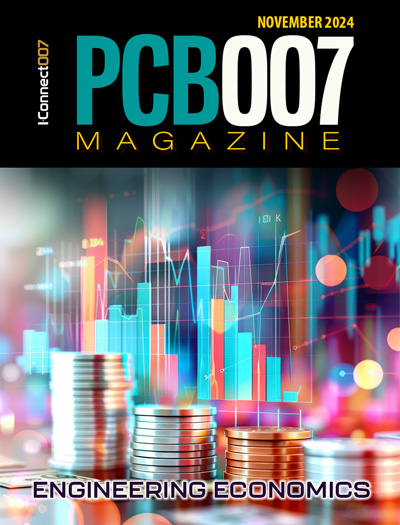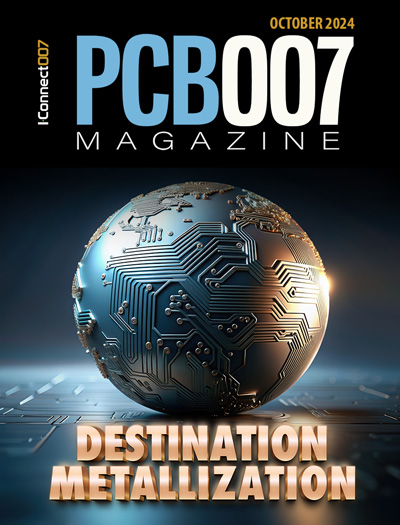-

- News
- Books
Featured Books
- pcb007 Magazine
Latest Issues
Current Issue
Inner Layer Precision & Yields
In this issue, we examine the critical nature of building precisions into your inner layers and assessing their pass/fail status as early as possible. Whether it’s using automation to cut down on handling issues, identifying defects earlier, or replacing an old line...

Engineering Economics
The real cost to manufacture a PCB encompasses everything that goes into making the product: the materials and other value-added supplies, machine and personnel costs, and most importantly, your quality. A hard look at real costs seems wholly appropriate.

Alternate Metallization Processes
Traditional electroless copper and electroless copper immersion gold have been primary PCB plating methods for decades. But alternative plating metals and processes have been introduced over the past few years as miniaturization and advanced packaging continue to develop.
- Articles
- Columns
Search Console
- Links
- Media kit
||| MENU - pcb007 Magazine
Schweizer Receives Future Prize from Ewald Marquardt Private Foundation for p² Pack Embedding Technology
May 10, 2024 | Schweizer Electronic AGEstimated reading time: 2 minutes
As the number of electric vehicles increases, so do the demands on electrical power management in vehicles. To make power generation and engine operation more efficient, Schweizer Electronic AG's p² Pack technology offers a long-term and sustainable solution to better convert and even recover the energy generated. This groundbreaking and important development was awarded the Future Prize by the Ewald Marquardt Private Foundation last week.
The primary goal of the Future Prize of the Ewald Marquardt Private Foundation is to promote the knowledge base, designs and results of such developments and their industrial application, as well as to provide new impetus with promising ideas. With its p² Pack embedding technology, a team from Schweizer Electronic AG was able to convince the jury from more than 40 submissions with just such an innovation: when a car with built-in p² Pack technology brakes, energy can be recovered to an unprecedented extent and fed back into the battery. This energy can then be used to accelerate the car electrically. This saves fuel in city traffic, for example, and actively reduces CO² consumption - a benefit for our future, the environment and society.
Prof. Hans-Jörg Bullinger, chairman of the jury of the Ewald Marquardt Private Foundation and former president of the Fraunhofer Society, and Mrs. Margaret Marquardt, widow of the founder Ewald Marquardt, who died in January 2022, and member of the board of the Ewald Marquardt Private Foundation, presented the special prize of the Future Prize 2023 of the Ewald Marquardt Private Foundation to the representatives of Schweizer Electronic AG Schramberg, Mr. Thomas Gottwald and Mr. Neumann. Thomas Gottwald and Mr. Neumann, the special prize of the Future Prize 2023 of the Private Foundation Ewald Marquardt, endowed with € 5,000, for their project last Friday, May 2, 2024. The Future Prize was awarded for the ninth time at the foundation's headquarters in Rietheim-Weilheim.
Thomas Gottwald, Chief Technology Officer of Schweizer Electronic AG, expressed his gratitude for the special award on behalf of the project team and the company: "The p² Pack technology is an innovative product that the end user will never see, but which brings great benefits and advantages to them personally, as well as to our environment and society. We would also like to thank our company, Schweizer Electronic AG, which has believed in our groundbreaking idea for years and has given us the space to develop a concept that has now become an important series product for the automotive industry".
The topic "p² Pack® – New Technology for the Integration of Power Semiconductors into Printed Circuit Boards" was submitted by Ms. Tanja Meister, Mr. Alexander Neumann, Mr. Artur Scheinemann and Mr. Thomas Gottwald from Schweizer Electronic AG.
Suggested Items
Quantum Communication With a Satellite
07/17/2017 | Max-Planck-Gesellschaft, MünchenIn the future, it will be possible to use quantum cryptography in global communication by transmitting quantum information from orbit.


